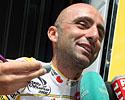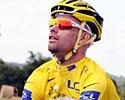Cycling News Flash, October 7, 2008Edited by Sue George and Laura Weislo Piepoli and Schumacher Tour de France samples positive for CERA
Both Leonardo Piepoli and Stefan Schumacher have tested positive for the performance enhancing substance CERA (Continuous Erythropoiesis Receptor Activator) according to reports released Monday. The riders were declared positive by the French Anti-doping Agency (AFLD) which last week re-tested a number of blood samples taken during the Tour de France. The Italian Piepoli tested positive twice according to a statement by the Italian Olympic Committee (CONI), and confirmed by the AFLD on Monday. Pieopoli's results came back positive for samples taken one day prior to the Tour on July 4 and also on July 15. During the same edition of the Tour de France, Piepoli's team-mate and stage winner Riccardo Ricc˛ also tested positive for the third-generation EPO. As a result, team director Mauro Gianetti pulled the entire Saunier Duval team from the race. Prior to the team's withdrawal, Piepoli won stage 10, and Ricc˛ won stage six and stage nine of the Tour de France. Ricc˛ confessed to CONI that he had used EPO and has since received a suspension totalling 24 months. According to Spanish media, Piepoli previously confessed to taking EPO; however, he later denied doping when called before CONI as a witness during a hearing concerning Ricc˛. CONI will hold a hearing with Pieopli on Friday, October 10. Double time trial winner positive
Stefan Schumacher tested positive after being targeted by the AFLD, and was one of the riders who turned in suspicious results for the urine test for CERA, according to his team manager, Hans-Michael Holczer. The AFLD was unable to declare a positive from the urine results, and last month ordered blood samples delivered from Lausanne, Switzerland, corresponding to the riders with suspicious results. "I heard the news a few minutes before – I read the report on L'Equipe and I got a phone call from Christian Prudhomme," said Holczer, confirming that he believed the report to be true. "The whole team has been betrayed ... I will do everything that is possible to sue him," he told Cyclingnews' Gregor Brown. The German who rides for Holczer's soon to be defunct Gerolsteiner team won both of the time trials in this year's Tour, taking the yellow jersey after his win on stage four and holding it for two days before crashing during the sprint into Super Besse on stage six. His second win came on stage 20 where he beat world champion Fabian Cancellara. Last month, he signed a contract with the Quick Step team, replacing two-time world champion Paolo Bettini on the Belgian squad. This isn't the first time that Schumacher has failed under suspicion of doping. In 2007, he showed abnormal blood values prior to the world championships. He attributed the changes to intestinal problems. Following the 2007 season, he crashed his car while under the influence of alcohol. In 2005, he tested positive for the stimulant cathine while racing for the Shimano-Memory Corp. team. He was cleared after demonstrating that his positive came from allergy medicine prescribed to him by his mother, a physician. The medicine contained the drug, but was not on the banned substances list. Mircera misinformation uncovers cheats?CERA (Continuous Erythropoiesis Receptor Activator) is a longer lasting form of EPO which supposedly results in a more stable increase in red blood cells. It is similar to previous generations of EPO, but has a chemical called polyethylene glycol attached to it. Because this molecule makes the drug larger, it was rumoured to be undetectable in urine, which may be why some riders were convinced that they could get away with using it. However, the AFLD used a two-pronged approach to root out cheaters in this year's Tour de France. They first checked the blood values of every rider in the Tour in pre-race screens, and began targeting any rider with suspicious values with additional controls. They then rolled out a urine test for Mircera, which was developed in co-operation with the manufacturer, Roche. The targeted tests ended up catching two riders: Riccò for CERA and Manuel Beltrán for EPO (the type was not announced). Moises Dueñas tested positive for EPO after a random control. The urine tests were somewhat unreliable at giving definitive results, so the AFLD decided to order the blood samples taken before and during the Tour for additional testing with a newly developed CERA blood test. The testing was delayed, but resumed last week, giving rise to rampant rumours about who might test positive. The positives of Piepoli and Schumacher are the first to come out of this new batch of testing. AFLD did not say how many more riders' blood was being tested. The UCI followed the French agency's example in August, putting Emanuelle Sella, the winner of three Giro d'Italia stages and the mountains classification, under the microscope. He was found to be positive in August after an out-of-competition control. (All rights reserved/Copyright Future Publishing (Overseas) Limited 2008) |

|
January 2009 |
Recently on Cyclingnews.com |


